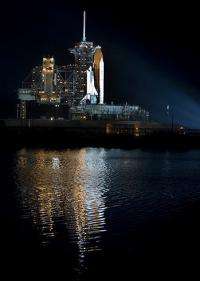Discovery liftoff postponed due to gas leak: NASA (Update)

The launch of the US space shuttle Discovery was postponed Wednesday just hours before liftoff after NASA engineers found a gas leak in the filling system for its external tank.
NASA spokesman Allard Beutel said the shuttle's mission towards the International Space Station, with a Japanese astronaut among its seven crew, was delayed for at least 24 hours after the leak of highly flammable hydrogen gas was discovered.
"The launch was scrubbed at 02:37 pm (1837 GMT) for at least 24 hours ... so we won't launch tonight," Beutel said.
It was yet another frustrating delay for the Discovery and its crew which have already seen the launch put back four times from its original date of February 12.
NASA engineers discovered the leak soon after they began filling the Discovery's external tank at noon (1600 GMT), and the hitch came just hours before the planned 9:20 pm (0120 Thursday GMT) launch at the Kennedy Space Center in Cape Canaveral, Florida.
The leak was found to be coming from a valve regulating the hydrogen pressure which is located inside the tank towards the top, Bill Johnson, communications director, told AFP.
NASA officials were to meet around 5:00 pm (2100 GMT) Wednesday to decide on their next move.
The external tank, which was three quarters full with some two million liters of fuel (528,000 gallons), mostly composed of liquid hydrogen kept at minus 252 degrees Celsius and liquid oxygen, will be emptied again.
The shuttle's crew had arrived at the Kennedy Space Center late Sunday to prepare for their 14-day mission to deliver and install a fourth pair of solar panels to the International Space Station.
The panels are to supply power for onboard laboratories and more power for the station's crew, which will double from three to six in May.
Installing the panels, the final piece of a 100-billion-dollar project, is to take a two-astronaut team four space walks of more than six hours each to complete, NASA said.
The pairs of solar panels, containing 32,800 solar cells, are each 35 meters long once in place. And the final array, once in place, should boost power available to the ISS to 120 kilowatts from the current 90.
The launch has now been delayed five times, mainly due to problems with control valves, which channel hydrogen from the shuttle's three main engines.
Discovery has to be launched by March 16 in order not to hamper the launch of a Russian Soyuz mission to the ISS due to liftoff on March 26, carrying American businessman Charles Simonyi.
The Soyuz is due to arrive on March 28 at the orbiting space station, meaning Discovery must have already left as both craft cannot dock at the ISS at the same time.
NASA officials have said they would be prepared to shorten Discovery's mission and drop two of the four planned space walks if they are forced to launch much later than planned.
Discovery's astronauts include Koichi Wakata of the Japan Aerospace Exploration Agency, who is to become the first Japanese station crew member.
After Discovery finally docks at the ISS, Wakata is to stay aboard the station, while US astronaut Sandy Magnus -- who arrived at the ISS aboard the shuttle Endeavour in November 2008 -- will return home.
(c) 2009 AFP


















